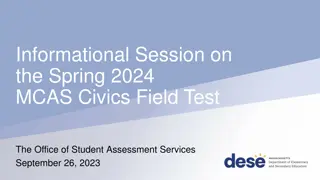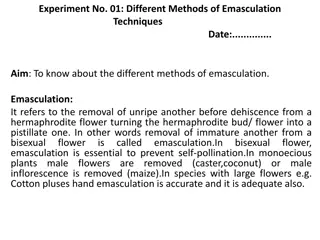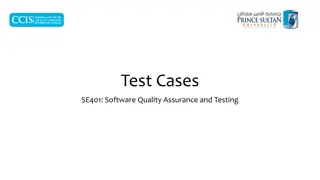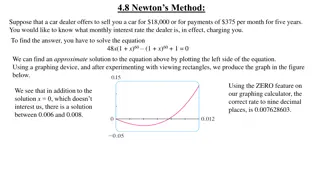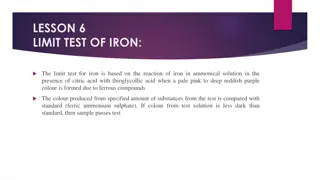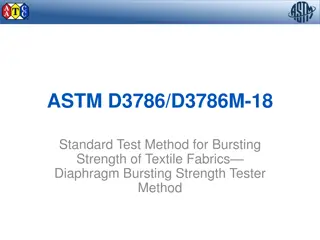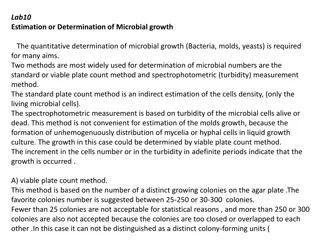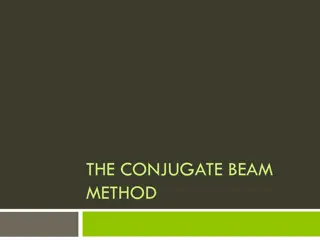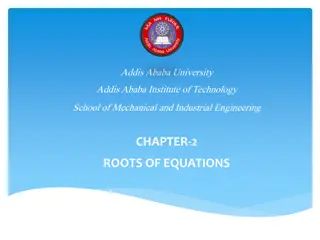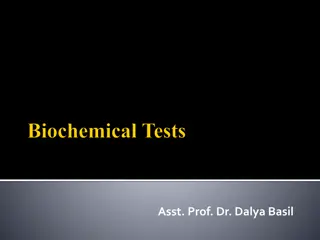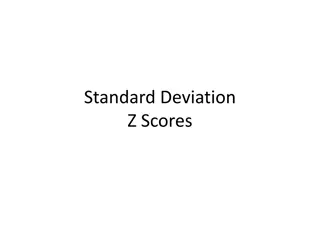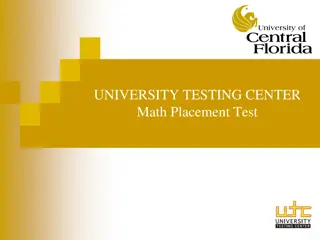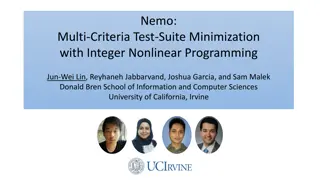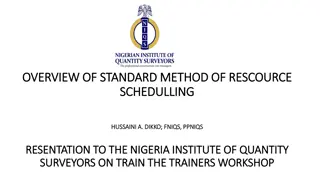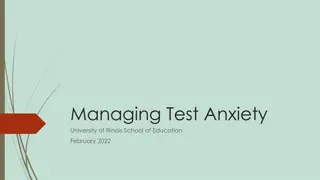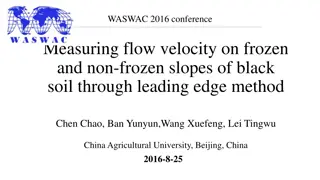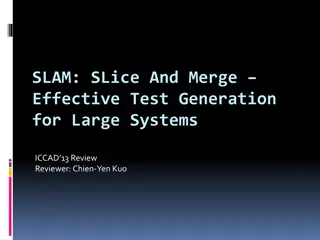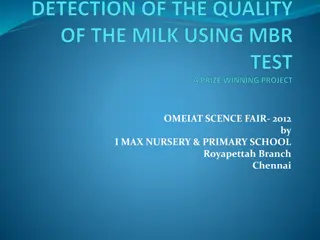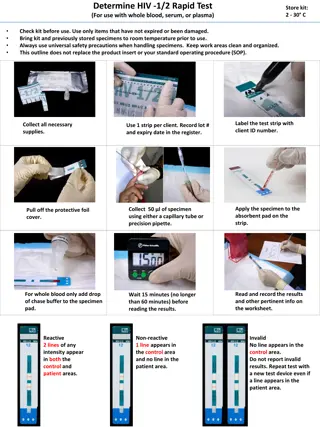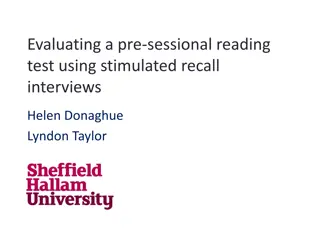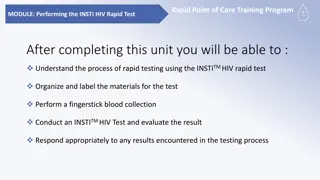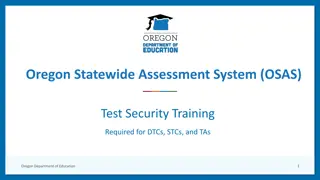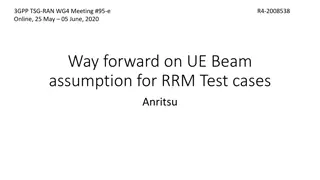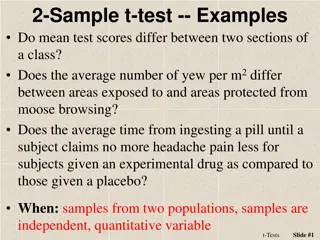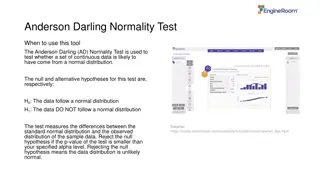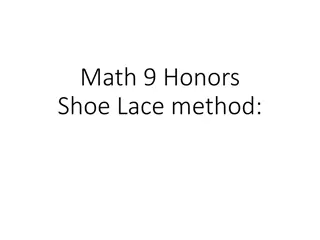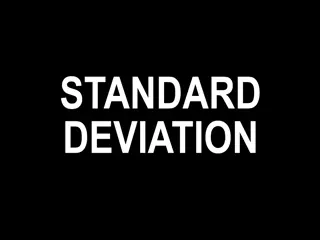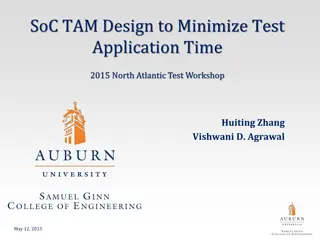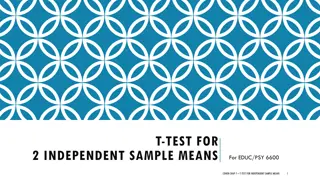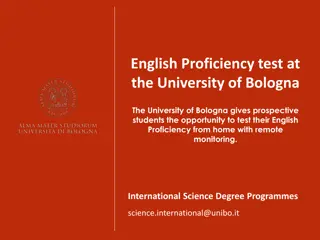Language Teaching Techniques: GTM, Direct Method & Audio-Lingual Method
Explore the Grammar-Translation Method, Direct Method, and Audio-Lingual Method in language teaching. Understand principles, objectives, and methodologies with insights into language learning approaches. Enhance teaching skills and foster effective communication in language education.
3 views • 82 slides
Understanding Advertising Media Effectiveness
Advertising effectiveness is crucial for brands to assess the impact of their marketing efforts on target audiences. By measuring strengths, weaknesses, and ROI of advertising campaigns, companies can optimize their strategies for future success. Various approaches such as pre-test, post-test, commu
1 views • 10 slides
MCAS Civics Field Test Overview for Spring 2024 Session
This informational session covers the upcoming MCAS Civics Field Test for Spring 2024, including test design, logistics, and agenda. Presenters share insights on the purpose of the field test, assessment content, and evaluation criteria. The session also details the timeline, test administration inf
5 views • 25 slides
Effective Strategies for Overcoming Test Anxiety
Learn practical methods to combat test anxiety in this 1-hour workshop by CCAMPIS Kayla Taylor. Topics covered include avoiding test anxiety, preparing effectively for tests, identifying and reducing sources of anxiety, quelling anxiety, test-taking strategies, and stress management. The PASS method
0 views • 13 slides
Understanding Different Emasculation Techniques in Plant Breeding
Learn about the significance of emasculation in plant breeding to prevent self-pollination and facilitate controlled pollination. Explore various methods such as hand emasculation, forced open method, clipping method, emasculation with hot/cold water, alcohol, suction method, chemical emasculation,
2 views • 10 slides
Understanding Software Testing: Test Cases, Selection, and Execution
Software testing plays a crucial role in identifying and resolving issues within software products. Test cases, selection, and execution are fundamental aspects of the testing process. Test cases define conditions for testing software functionality, with a focus on repeatability and data specificity
2 views • 36 slides
Understanding Newton's Method for Solving Equations
Newton's Method, also known as the Newton-Raphson method, is a powerful tool for approximating roots of equations. By iteratively improving initial guesses using tangent lines, this method converges towards accurate solutions. This method plays a crucial role in modern calculators and computers for
0 views • 12 slides
Limit Test of Iron Based on Color Reaction with Thioglycollic Acid
The limit test for iron involves the reaction of iron in ammoniacal solution with citric acid and thioglycollic acid to form a reddish-purple color. By comparing the color produced with a standard solution, the presence of iron is determined. Citric acid prevents precipitation of iron, while thiogly
1 views • 5 slides
ASTM D3786/D3786M-18 Standard Test Method for Bursting Strength of Textile Fabrics
This standard test method, ASTM D3786/D3786M-18, specifies the procedure for determining the bursting strength of textile fabrics using a diaphragm bursting strength tester. The test involves clamping the specimen over an expandable diaphragm and applying pressure until the fabric ruptures. The burs
0 views • 16 slides
Methods for Determination of Microbial Growth
Quantitative determination of microbial growth is crucial for various purposes, with two commonly used methods being the standard plate count and spectrophotometric measurement. The standard plate count method estimates living microbial cell density, while spectrophotometric measurement relies on tu
2 views • 6 slides
Understanding the Conjugate Beam Method in Structural Analysis
The Conjugate Beam Method is a powerful technique in structural engineering, derived from moment-area theorems and statical procedures. By applying an equivalent load magnitude to the beam, the method allows for the analysis of deflections and rotations in a more straightforward manner. This article
1 views • 11 slides
Understanding Roots of Equations in Engineering: Methods and Techniques
Roots of equations are values of x where f(x) = 0. This chapter explores various techniques to find roots, such as graphical methods, bisection method, false position method, fixed-point iteration, Newton-Raphson method, and secant method. Graphical techniques provide rough estimates, while numerica
0 views • 13 slides
Understanding Coagulase Test in Microbiology
The Coagulase test is a crucial microbiological method used to differentiate Staphylococcus aureus (Coagulase Positive) from other Staphylococci (Coagulase Negative). By detecting the presence of the enzyme coagulase, this test helps identify pathogenic strains of Staphylococcus that can cause serio
2 views • 28 slides
Understanding Complement Fixation Test (CFT) in Immunology
Complement Fixation Test (CFT) is a key immunological method used to detect specific antibodies in a patient's serum by using complement proteins. This test involves the stages of incubation with antigens, inactivated serum, and complement, followed by the indicator stage using sheep red blood cells
1 views • 17 slides
Understanding Standard Deviation, Variance, and Z-Scores
Explore the importance of variation in interpreting data distributions, learn how to calculate standard deviation, understand z-scores, and become familiar with Greek letters for mean and standard deviation. Discover the significance of standard deviation in statistical analysis and the difference b
1 views • 18 slides
University Math Placement Test Overview
The University Math Placement Test is a tool to help place students accurately into math courses, ensuring their success. It consists of three practice tests - Algebra, Trigonometry, and Precalculus. Students start with the Practice Algebra Test and have the opportunity to advance based on their sco
0 views • 13 slides
Workplace Exposure Standard for Silica Dust in Stone Benchtop Fabrication
Reduction in workplace exposure standard for respirable crystalline silica dust has been implemented, halving the national standard to 0.05 mg/m3. The new standard aims to protect workers in stone benchtop fabrication businesses from serious lung diseases caused by breathing in silica dust. Employer
1 views • 8 slides
Multi-Criteria Test Suite Minimization with Integer Nonlinear Programming
The study introduces a method for minimizing test suites using Integer Nonlinear Programming. It addresses regression testing challenges, such as managing large numbers of test cases, through Multi-Criteria Test Suite Minimization (MCTSM). The research explores the application of Integer Programming
0 views • 34 slides
Determination of Dipole Moment in Chemistry
The determination of dipole moment in chemistry involves methods such as the Temperature Method (Vapour Density Method) and Refractivity Method. These methods rely on measuring various parameters like dielectric constants and polarizations at different temperatures to calculate the dipole moment of
1 views • 15 slides
Overview of Standard Method of Resource Scheduling for Effective Project Management
Resource Schedule Documents (RSD) prepared using Standard Method of Resource Scheduling 1 (SMRS 1) facilitate efficient allocation, planning, and management of resources. The RSD includes sections detailing employer and contractor responsibilities, material issues, method statements, and charges. SM
0 views • 9 slides
Understanding the Test of Promotion in Christian Ministry
The Test of Promotion in Christian ministry is designed to assess and examine the attitudes, motives, and true inner beliefs of individuals called by God. It serves to identify those truly called, equip them with spiritual understanding, and test their faith for trustworthiness. Passing through this
1 views • 20 slides
Managing Test Anxiety Tips for Success in Illinois Licensure Exam
Successfully passing the Illinois licensure test requires not only content knowledge but also effective test-taking strategies and managing test anxiety. This guide provides valuable tips on addressing test anxiety before the exam, including putting things in perspective, recalling past successes, u
0 views • 14 slides
Measurement of Flow Velocity on Frozen and Non-Frozen Slopes of Black Soil Using Leading Edge Method
This study presented a detailed methodology for measuring flow velocity on frozen and non-frozen slopes of black soil, focusing on the Leading Edge method. The significance of shallow water flow velocity in soil erosion processes was emphasized. Various methods for measuring flow velocity were compa
0 views • 23 slides
Efficient Test Generation for Large Systems Using SLAM
This research discusses SLAM (SLice And Merge), a method for effective test generation in large systems. It focuses on using test templates to generate test cases efficiently, slicing the system into subsets with different templates assigned to each slice, and merging multiple templates for thorough
0 views • 22 slides
Methylene Blue Reduction Test for Milk Quality Assessment
The Methylene Blue Reduction (MBR) test is utilized to assess the quality of milk based on the reduction of color imparted by a dye. The disappearance of color indicates the presence of bacteria in milk. This test involves adding methylene blue dye to milk samples, observing the color change, and me
0 views • 20 slides
Gas Cool-Down Method and Test Mass Curves Study
Diagrams and data charts illustrate the N2 gas cool-down method and test mass curves study conducted by Jaimi Salone and Edgard Bonilla on 08/28/18. The study focuses on maintaining pressure internally, cooling down the test mass efficiently, and achieving successful outcomes in pressure control acr
0 views • 9 slides
HIV Rapid Test Procedures and Instructions
This content provides detailed instructions for conducting HIV rapid tests using three different kits: Determine HIV-1/2 Rapid Test, Uni-Gold HIV-1/2 Rapid Test, and Bioline HIV-1/2 Rapid Test. The instructions include steps such as specimen collection, test device preparation, result interpretation
0 views • 5 slides
Evaluation of Pre-sessional Reading Test Using Stimulated Recall Interviews
This evaluation study examines a pre-sessional reading test through stimulated recall interviews to understand how students tackled the test, what reading skills and strategies they employed, and if the test items effectively elicited the intended cognitive processes. Data was collected from two coh
1 views • 32 slides
Rapid Point of Care Training Program - Performing the INSTI HIV Rapid Test
This training module provides a comprehensive guide on conducting rapid HIV testing using the INSTI HIV rapid test. It covers organizing materials, performing blood collection, conducting the test, and interpreting results. The INSTI HIV rapid test is licensed in Canada and approved in Ontario for r
0 views • 12 slides
Oregon Statewide Assessment System (OSAS): Test Security Training Overview
This information outlines the test security training requirements for Designated Test Coordinators (DTCs), School Test Coordinators (STCs), and Test Administrators (TAs) in Oregon's Statewide Assessment System (OSAS). It covers topics like ensuring a secure testing environment, handling printed test
0 views • 20 slides
Unified System of Physical Fitness Testing for Squash Players
The Viking Squash Test offers a unified system for physical fitness testing tailored to the needs of squash players. It provides a cost-effective and straightforward method to assess physical fitness under conditions reflecting real sport performance. The test allows for easy comparison of fitness l
0 views • 17 slides
Update on UE Beam Assumption for RRM Test Cases in 3GPP Meetings
The latest developments in 3GPP meetings regarding UE beam assumption for RRM test cases are outlined. Discussions include the need for UE beam type assumptions, updates to test cases for FR2, and upcoming presentations focusing on specific test cases and beam assumptions per test group. Test purpos
0 views • 9 slides
Understanding 2-Sample t-Test Examples
The 2-sample t-test is used to determine if mean scores differ between two groups in various scenarios, such as comparing test scores in different sections, yew density in moose browsing areas, or headache pain relief with different treatments. Key steps include formulating hypotheses, calculating t
0 views • 13 slides
Understanding the Anderson-Darling Normality Test
Conducting the Anderson-Darling Normality Test helps determine if a set of continuous data follows a normal distribution. The test involves comparing the sample data distribution with a standard normal distribution and evaluating the p-value to either accept or reject the null hypothesis. By collect
0 views • 5 slides
Understanding the Shoe Lace Method for Finding Polygon Areas
The Shoe Lace Method is a mathematical process used to determine the area of any polygon by employing coordinate geometry. By following specific steps, including organizing coordinates, multiplying diagonally, and adding columns in a certain manner, the method allows for a straightforward calculatio
0 views • 8 slides
Mantoux Test: Procedure and Administration Guidelines for TB Screening
The Mantoux test, a standard method for detecting Mycobacterium tuberculosis infection, involves injecting Tuberculin Purified Protein Derivative (PPD) into the skin. This test is administered to individuals including children and those with TB exposure history. Proper injection technique and site s
0 views • 20 slides
Understanding Standard Deviation and Standard Error of the Means
Standard deviation measures the variability or spread of measurements in a data set, while standard error of the means quantifies the precision of the mean of a set of means from replicated experiments. Variability is indicated by the range of data values, with low standard deviation corresponding t
0 views • 7 slides
Efficient Design Strategies for Minimizing Test Application Time in SoC
This paper discusses innovative design approaches to minimize test application time (TAT) in System-on-Chip (SoC) testing. It addresses challenges in incorporating hardware and power constraints into SoC test scheduling, focusing on test access mechanism (TAM) design and test scheduling strategies.
0 views • 23 slides
Introduction to Independent Sample Means T-Test in Educational and Psychological Research
Independent Sample Means T-Test is a statistical analysis used to compare the means of two independent groups to determine if there is a significant difference between them. This test is commonly used in educational and psychological research to assess the effectiveness of interventions or treatment
0 views • 21 slides
English Proficiency Test at University of Bologna: Remote Monitoring Option
University of Bologna offers prospective students the chance to test their English proficiency from home with remote monitoring. The test is available for programs including Science of Climate, Physics, Astrophysics, and more. Applications are made via email with specific test dates and technical re
0 views • 11 slides


